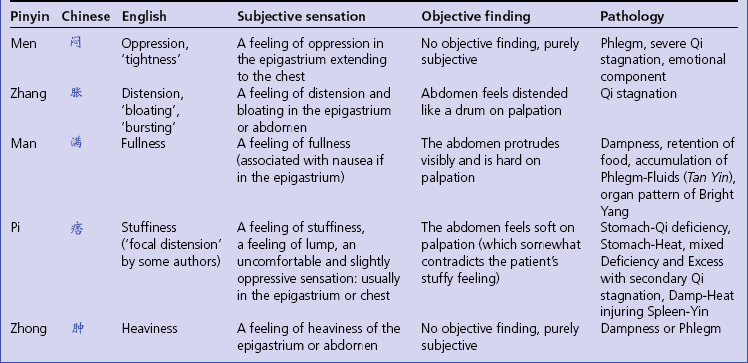Chapter 30 The Stomach and Spleen are the Root of Post-Heaven Qi and their state affects all the other internal organs; for this reason, it is always necessary to ask questions to assess their state. This is all the more important given the frequency of digestive complaints in Western patients. The Stomach controls the rotting and ripening of food and for this reason it is compared to a bubbling cauldron in the Middle Burner. The Spleen controls the transformation and transportation (Yun Hua) of Qi and it therefore affects the transportation and transformation of food essences in the Middle Burner. Thus, the Stomach and Spleen together are responsible for the proper digestion of food. However, in Chinese medicine, the function of the Stomach and Spleen goes beyond that of digesting food as, in the process of doing so, they are the source of Food Qi (Gu Qi), which, in turn, forms the Gathering Qi (Zong Qi) and True Qi (Zhen Qi). Thus, the Stomach and Spleen are the source of Post-Heaven Qi and an enquiry into the state of these two organs is crucial in every case. The main patterns causing digestive symptoms are: Retention of food causes a feeling of fullness in the epigastrium if the Stomach is affected and in the abdomen if the Spleen is affected; the latter affects children more than adults. In the case of the Stomach, there may sour regurgitation, nausea and poor appetite. Table 30.1 illustrates the differentiation of symptoms between Stomach and Spleen in the various patterns. Table 30.1 Differentiation of Stomach and Spleen digestive symptoms according to pattern Thus, the five main sensations experienced in the digestive system are a feeling of distension, fullness, oppression, stuffiness and heaviness. Table 30.2 illustrates the pathology and diagnostic manifestation of these five sensations.1
 FOOD AND TASTE
FOOD AND TASTE
HOW WE ASK
MAIN PATTERNS OF DIGESTIVE SYMPTOMS
Retention of food
Pattern
Stomach
Spleen
Qi deficiency
Slight epigastric discomfort, dull, slight pain improved by eating, poor appetite
Poor appetite, slight abdominal distension, loose stools
Qi stagnation
Epigastric distension
Abdominal distension
Qi rebellious
Hiccup, belching, nausea, vomiting
Loose stools, diarrhoea
Blood stasis
Stabbing, fixed epigastric pain, vomiting of blood
Stabbing, fixed abdominal pain, blood in stools
Dampness
A feeling of fullness and heaviness of the epigastrium, sticky taste, poor appetite
A feeling of fullness and heaviness of the abdomen
Phlegm
A feeling of oppression of the epigastrium, sticky taste, nausea, poor appetite
Retention of food
A feeling of fullness and pain of the epigastrium, sour regurgitation, nausea, poor appetite
A feeling of fullness and pain of the abdomen
![]()
Stay updated, free articles. Join our Telegram channel

Full access? Get Clinical Tree


FOOD AND TASTE

